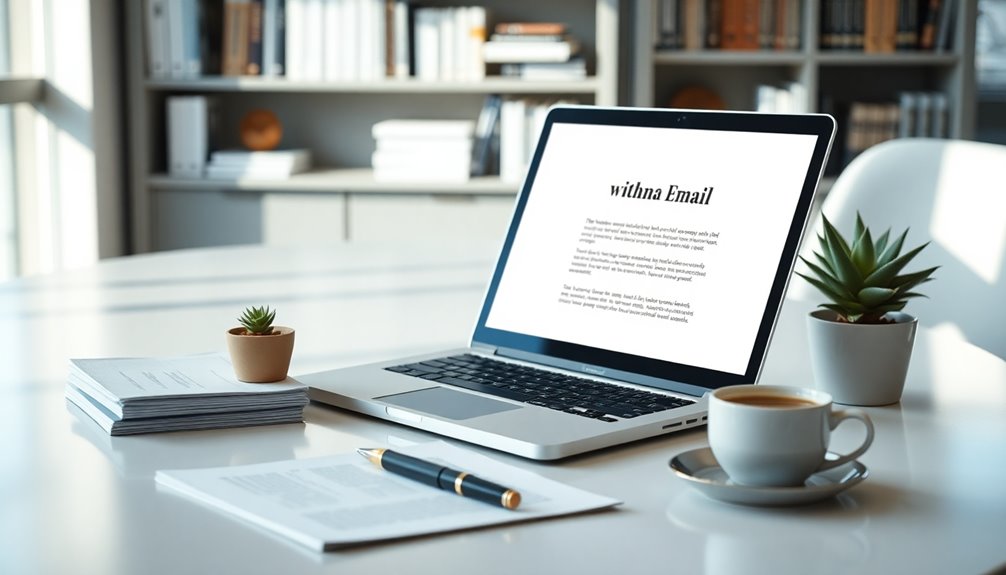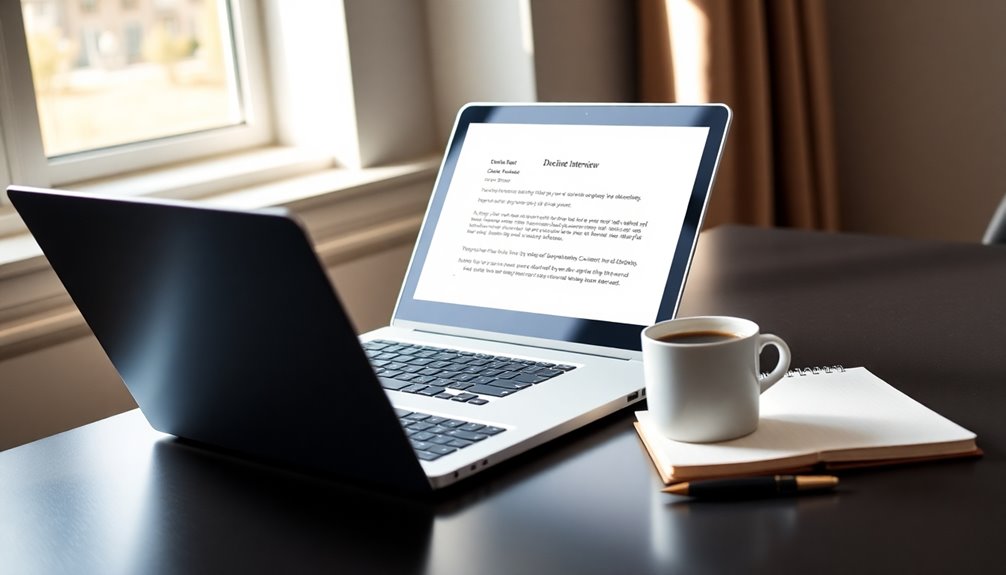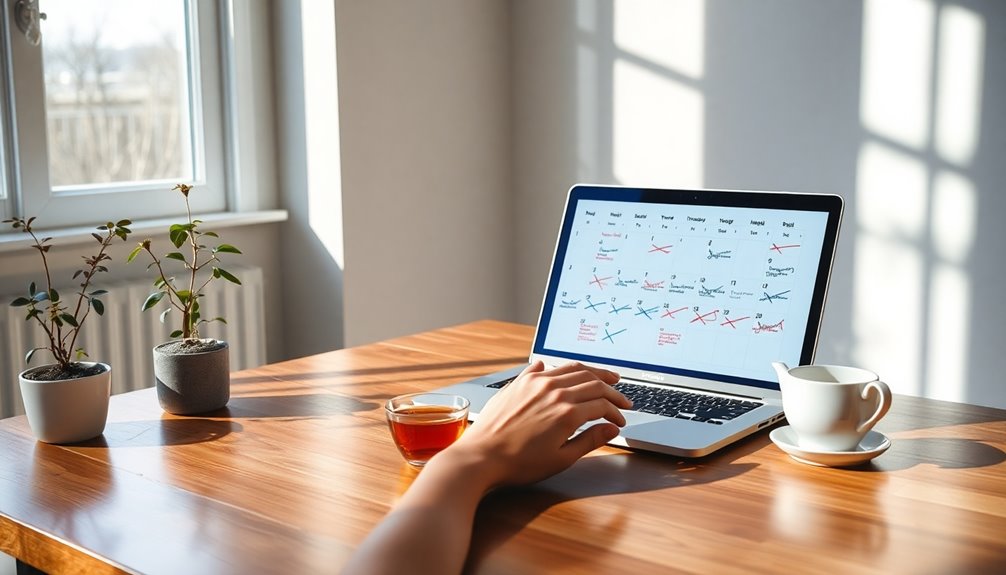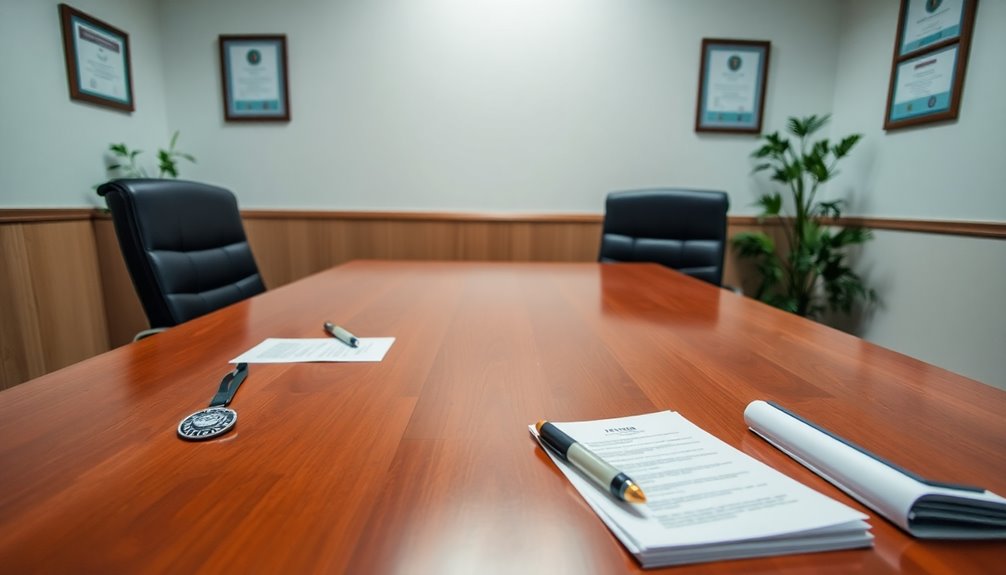Mastering the art of declining interviews is essential for your professional reputation and future opportunities. Reflect on your reasons for declining, whether it's accepting another job or realizing the role isn't a fit. Always communicate your decision promptly, ideally via email. Keep your message concise and polite, expressing gratitude for the opportunity. You can even suggest another candidate if it feels appropriate. Remember, the way you decline can leave a lasting impression, so professionalism is key. If you're looking for effective templates and tips to craft your message, there's more valuable information waiting for you.
Key Takeaways
- Reflect on your reasons for declining to ensure clarity in your decision-making process.
- Communicate your decision promptly and respectfully to the hiring manager via email.
- Express gratitude for the opportunity and acknowledge the effort made on your application.
- Keep your message concise, avoiding lengthy explanations while maintaining professionalism.
- Consider suggesting another candidate if appropriate to support the company in their search.
Reasons to Decline an Interview

When you're faced with the decision to decline an interview, several valid reasons might lead you to this choice.
Perhaps you've recently accepted another job offer that aligns better with your career goals. You might also worry about potential conflicts with your current employer, making it difficult to pursue a new opportunity.
After completing interviews, you may realize the position isn't a good fit for you. Insider knowledge could reveal a mismatch with the company culture, causing you to reconsider.
Finally, you might discover that the company's mission doesn't align with your personal goals, prompting you to prioritize your values over a job offer.
Evaluating these factors can help you make an informed decision.
Steps to Politely Decline

Once you've made the decision to decline an interview, it's important to approach the situation thoughtfully. Here are some steps to guarantee you handle it well:
- Reflect on your reasons for declining.
- Seek feedback from someone you trust.
- Communicate your decision promptly.
- Use email for a respectful and convenient response.
Taking these steps helps you maintain professionalism. Start by clearly stating your intention to decline, followed by expressing gratitude for the opportunity. Additionally, consider how your decision may impact your future relationships in the professional realm.
Tips for a Respectful Decline

Declining an interview respectfully can preserve your professional relationships and open doors for future opportunities. Here are some tips to help you navigate this process:
| Tip | Explanation | Benefit |
|---|---|---|
| Maintain Politeness | Use courteous language in your response. | Leaves a positive impression. |
| Keep it Concise | Avoid lengthy explanations for your decision. | Keeps communication clear. |
| Notify the Primary Contact | Inform the main point of contact promptly. | Shows respect for their time. |
| Suggest Another Candidate | If appropriate, recommend someone else. | Helps the company continue their search. |
Additionally, consider how your decision might impact your future job opportunities, as maintaining good relationships can be beneficial in the long run.
Email Template for Withdrawal

Crafting a thoughtful email to withdraw from an interview is essential for maintaining professionalism.
Here are some key points to remember:
- Always thank the hiring manager for their time.
- Clearly state your intention to withdraw from the process.
- Acknowledge the effort they put into reviewing your application.
- Wish them success in finding the right candidate.
Sample Emails for Declining

When you need to decline an interview, having a few sample emails on hand can make the process smoother. Here's a quick reference table with different scenarios you might encounter:
| Scenario | Sample Email |
|---|---|
| Personal circumstances | "Thank you for the opportunity, but due to personal circumstances, I must withdraw my application." |
| Appreciation and well-wishes | "I appreciate the time spent on my application and wish you success in finding the right candidate." |
| Change in availability | "I regret to inform you that a change in my personal situation affects my availability for this role." |
It's important to remember that emotional manipulation can occur in various interactions, so maintaining professionalism is key. Feel free to tweak these samples to fit your style, but keep them polite and concise. A gracious decline can leave a positive impression for future opportunities.
Frequently Asked Questions
How Common Is It to Decline an Interview?
It's quite common to decline an interview for various reasons.
Many candidates may have accepted another job offer or realized the role isn't the right fit after further consideration.
You might find that personal circumstances change, making it difficult to pursue an opportunity.
While it's not uncommon, handling the situation with professionalism is key, as you want to maintain good relationships for future opportunities.
Always communicate your decision respectfully and promptly.
Will Declining Affect My Chances With the Company Later?
Declining an interview might feel like closing a door, but it doesn't always lock you out. If you handle it professionally, express gratitude, and keep the lines of communication open, you could still leave a positive impression.
Companies often appreciate candor and respect your decision, especially if they understand your reasons.
Can I Decline an Interview After Accepting It?
Yes, you can decline an interview after accepting it, but it's important to handle it professionally.
Reflect on your reasons, then communicate your decision promptly to the hiring manager. A brief, polite email expressing gratitude for the opportunity while explaining your change of circumstances will go a long way.
Is It Appropriate to Decline Multiple Interviews From the Same Company?
Yes, it's appropriate to decline multiple interviews from the same company if you've reassessed your fit for the role or the company culture.
Just be respectful and clear in your communication. You might want to express gratitude for the opportunity while briefly explaining your reasons.
Keeping it professional helps maintain a positive relationship, as you never know when another opportunity might arise with them in the future.
What if I've Already Traveled for the Interview?
If you've already traveled for the interview, it's understandable to feel conflicted about declining.
However, your circumstances may change, and it's important to prioritize your own needs. Reflect on why you want to decline, and if it still aligns with your goals.
Communicate your decision promptly and politely, acknowledging the effort involved. A respectful approach can help maintain a positive relationship with the company, even if you don't pursue the opportunity further.
Conclusion
In the ever-changing job market, it's easy to feel overwhelmed, but remember: prioritizing your career path is essential. When you decline an interview with respect and clarity, you're not just stepping back; you're making space for opportunities that truly align with your goals. Every choice you make shapes your journey. Embrace the power of saying "no" when it's needed, and trust that each decision brings you closer to the right fit for your future.









